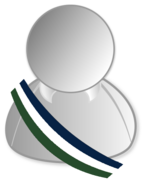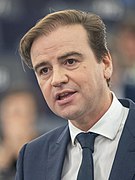National Bloc (Alsland)
This article is incomplete because it is pending further input from participants, or it is a work-in-progress by one author. Please comment on this article's talk page to share your input, comments and questions. Note: To contribute to this article, you may need to seek help from the author(s) of this page. |
National Bloc Nasjonaal blok Nationaler Block Lėodsameln Rahvuslik blokk | |
|---|---|
| Abbreviation | NB LS (Fawkhamshire and Hamptonshire) |
| Leader | Konrad Dünhaupt (Sotirian Union) |
| Founded | June 11, 1981 |
| Preceded by | Sotirian Bloc |
| Headquarters | Yndyk |
| Ideology | Liberal conservatism Sotirian Democracy Social Conservatism Minority politics Euclofederalism Ordoliberalism Factions: Conservative liberalism |
| Political position | Centre-right |
| Euclean Parliament group | ACDE (SDF, SU, KP, LY) AFRE (OP) |
| Colors | Blue |
| Slogan | "With the people" |
| Member parties | |
| Folkssenaat | 74 / 235
|
| Members of the Federal Presidency | 1 / 4
|
| Euclean Parliament | 11 / 24
|
| Website | |
| nasjonaalblok | |
The National Bloc (Dellish: Nasjonaal blok, Weranian: Nationaler Block, Swathish: Lėodsameln, Kirenian: Rahvuslik blokk; NB) is a Liberal conservative political bloc in Alsland. The Bloc is the second largest bloc in Alsland and major participant in the country's 'Bloc system'. The bloc is a member of the Alliance of Conservatives and Democrats for Euclea.
The bloc is traditionally a moderate, and conservative with connections to the Sotirian Church. During the 20th century the bloc was a major proponent of Euclean Integration, Sotirian Democracy, Traditional family values and Ordoliberalism. However since the beginning of the 21st century the bloc has moderated it's position and officially supports LGBT rights. The bloc defines itself as "a Liberal Conservative bloc based on protecting Alslandic values of Friendship, Democracy, tolerance and International cooperation."
The bloc considers itself to be the official successor to the Alslander Bloc which governed Alsland during the Great War. The Bloc was officially founded by conservative members of the Sotirian Bloc in 1981. The Sotirian Bloc merged with the National Bloc in 1983, the Bloc later went onto become the largest group in the 1985 election but were locked out of power until 1988 by a coalition of the Social Democratic Bloc and the Centre Party.
History
Grand coalition and opposition 1985-2004
Nieuwenhuis and 2008-09 political crisis 2004-2009
Coalition governments 2009-2021
Dünhaupt and opposition 2021-Present
Ideology
Policy overview
- Economy and Finance
- Support for a Market economy
- Keeping a Balanced budget
- Welfare state status quo
- Social and federal affairs
- Official language status for Kirenian
- Home rule for the communities
- Support for same-sex marriage
- Secularism
- Reduction in immigration
- Opposition to Euthanasia
- Universal Health Insurance
- Foreign affairs
- Euclofederalism
- ECDTO membership
- Internationalism
Member parties
| Party | Scope | Folkssenaat | Euclean Parliament | Ideology | |
|---|---|---|---|---|---|
| Sotirian Democratic Front (SDF) | Hamptonshire, Fawkhamshire | 28 / 231
|
3 / 24
|
Swathish minority politics Sotirian Democracy Pro-Eucleanism | |
| Sotirian Union (SU) | Garz, Zittau | 23 / 231
|
5 / 24
|
Weranian minority politics Sotirian Democracy Pro-Eucleanism Social Conservatism | |
| Conservative Party (KP) | Delland, Middewald | 20 / 231
|
2 / 24
|
Dellish minority politics Liberal conservatism Euclofederalism | |
| Justice Party (OP) | Martiland | 3 / 231
|
0 / 24
|
Kirenian minority politics Social Conservatism Sotirian Democracy | |
| Liveable Yndyk (LY) | Yndyk | 0 / 231
|
1 / 24
|
Yndyk regionalism Conservative liberalism Classical liberalism | |
Electoral results
Folkssenaat
Euclean parliament
Representation
Federal level
Achim Lehmann, member of the Federal Presidency
Griġm Vaġner, leader of the Sotirian Democratic Front
Andrej Kirschenbaum, leader of the Sotirian Union.
Jolke Dekker, leader of the Conservative Party.
Siimon Peebo, leader of the Justice Party.
Provincial and municipal level
Ryk Monteverde, Mayor of Wottested.
Konrad Dünhaupt, Minister-President of Zittau.
Imma Hoogland, Minister-President of Delland.
Arþur Troġġe, Minister-President of Fawkhamshire.
Electorate
Much of the party's support comes from the 'Sotirian Pillar' of Alsland. Many of it's supporters are members of the middle class or in rural areas. The Bloc has tried expanding it's support among the working class in the past.
Relationships to other parties and blocs
The National Bloc has cooperated on several occasions with the Progressive Alliance, the two have formed numerous coalition governments spanning from the collapse of the Alslander Bloc. The two Blocs are close regarding economic issues compared to the Centre Party which is substantially more economically liberal. However both blocs have ruled out entering a coalition with the other in the aftermath of the Brandsma government which had resulted in defections from both blocs to more radical political parties.
The National Bloc was critical of the establishment of Together for the Republic in 2021 which it considered as damaging to the pillarised system in Alsland as it combined elements of the Liberal, Sotirian and Socialist pillars.
The Bloc shared a close relationship with the United Democratic Union and it's successor the Orange Party. It's relationship with the Orange Party has been criticised by moderate members of the Bloc due to the Orange Party's ideology. The Bloc is the traditional enemy of Maitiid and it's predecessors. However Maitiid and the National Bloc formed a coalition in the Dellish Community to prevent a centre-left Progressive Alliance led government.





